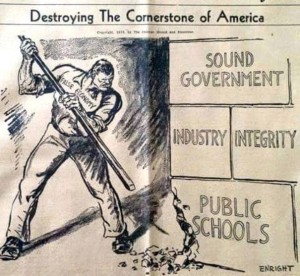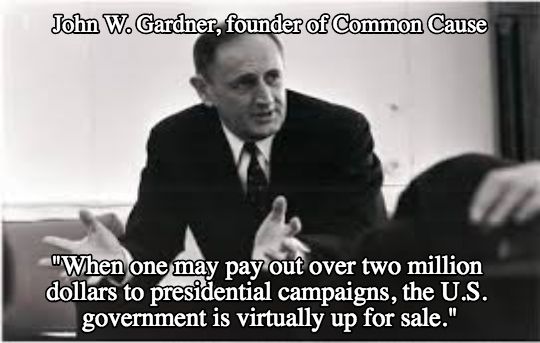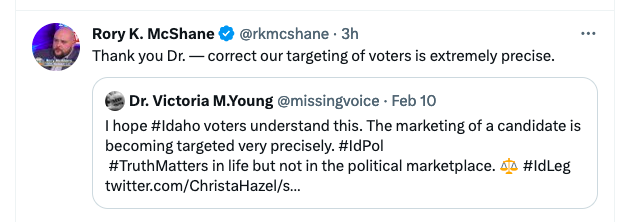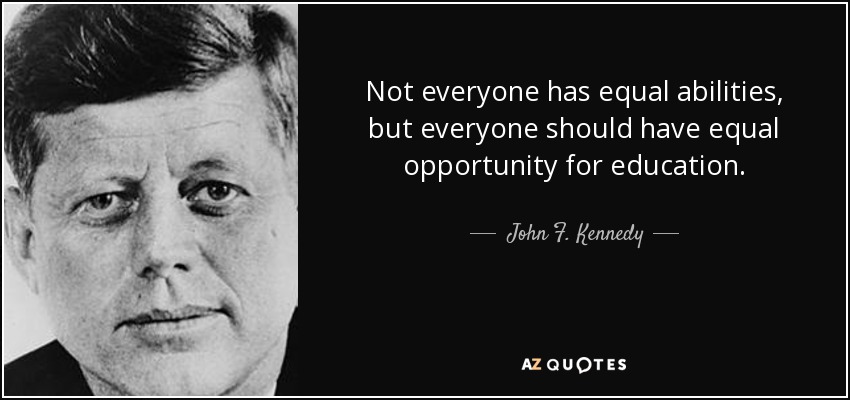PART ONE
“Public choice [theory] should be understood as a research program rather than a discipline or even subdiscipline of economics.”* 2003
Those words are from a Hillsdale College speech by Nobel Prize winning economist, James M. Buchanan, in explaining “Public Choice Theory” (PCT). But his advice was too little, too late. PCT —a research theory— had already been weaponized and unleashed on the public.
While using PCT to manipulate the public, what started as a stealth attack aimed at the heart of American democracy is now a full-fledged, outright war against the People’s right to govern. “Winning” requires the crippling of public institutions essential to ensuring educated and informed voters. Therefore, with public education being imperative to educating the masses, the masses now need to understand how PCT —not CRT (Critical Race Theory)— is the weapon being used to destroy public education and the core of our republic.
Understanding is crucial to being able to repair the damage.
 From the screaming matches at local school board meetings to the halls of Congress, the PCT strategy of tapping into passions—using people’s desires, fear, anger, and frustration as bait—is focused at American “Rule of Law.”
From the screaming matches at local school board meetings to the halls of Congress, the PCT strategy of tapping into passions—using people’s desires, fear, anger, and frustration as bait—is focused at American “Rule of Law.”
“Their” Problem Created A Problem for Us
As political economists have long viewed it, the problem is; how can democracy (majority rule) provide justice for all (not discriminate against minorities) and “yield net benefits”* to taxpayers?
That is the mixing of political theory and economic (market) theory that defines the group of scholars called political economists. But the problem for regular Americans is that we don’t think in their terms, or live our lives based on their theories. Unfortunately, it’s their theories applied to our rules of governing that is destroying the foundation of our country.
Our problem is we are feeling the negative effects of the “Us versus Them” War without being able to see who “they” are or understand how “they” are using us.
Here’s how I came to that conclusion — by looking more closely at PCT.
The Foundation of PCT
Buchanan explained the basis of PCT in reference to two levels of collective decision-making.
Ordinary politics is how decisions are made by legislative bodies.
Constitutional politics sets the rules for ordinary politics to function under.*
Reasonable enough?
We all have an opportunity to try and influence ordinary politics —vote, go to hearings, testify to lawmakers, work with organizations to influence the lawmaking process, etc. But it is within the rule-making process —of constitutional politics—where most Americans cannot remain vigilant enough to guard against those wishing to subvert the “consent of the governed.”
“From the perspective of both justice and efficiency, majority rule may safely be allowed to operate in the realm of ordinary politics, provided that there is generalized consensus on the constitution, or on the rules that define and limit what can be done through ordinary politics.” *
Hum…generalized consensus on constitutional politics? That is exactly what “we” have lost control over. “They” —those with enough money to play the political game they created— have ALMOST total control in a majority of states. Hold that thought.

John W. Gardner (R)(1912-2002). This picture probably was taken during his time working in the Kennedy administration. The price has only gone up since then.
Buchanan, and others, may have honestly wanted to contribute to solving the problem of maintaining stability, justice, and efficiency in government. But instead, PCT’s application —a research theory’s application— in the United States fostered distrust and dysfunction. It may lead to total destruction of our republic if we don’t stop its aim at the Constitution.
Our defense starts with understanding.
Precursor to Public Choice Theory (PCT)
Buchanan drew from the work of Swedish economist Knut Wicksell. Back in the 1800’s, Wicksell assumed majority rule produces discrimination against the minority along with government inefficiencies. He concluded collective actions require unanimity. However, knowing unanimous consent on all issues is impractical, qualified or supermajority votes seemed a logical solution.
There’s logic underlying the idea of a supermajority requirement in constitutional politics. But the problem now appears to be where that logic is applied and where it isn’t. For example, some states require supermajority votes for needed school building bonds. Yet, when determining life-long seats on the Supreme Court (a constitutional political action), the Senate supermajority rule has flip-flopped without so much as a thought to our general consent.
But back to the PCT story. Wicksell’s conclusions led Buchanan, with Gordon Tullock, to write The Calculus of Consent. On Amazon, some excerpts from the book’s description explain major points.
“… The authors acknowledge their unease as economists in analyzing the political organization, but they take the risk of forging into unfamiliar territory because they believe the benefits of their perspective will bear much fruit.”
“… We examine the [choice] process extensively only with reference to the problem of decision-making rules.’”
In other words, they looked through their economic lenses as to how individuals make marketplace purchasing decisions and used those observations in analyzing public decision-making —such as voting.
When all of us are seen as “self-interested players in the marketplace,” ** we are vulnerable to division. Competition for public services runs the high risk of destroying community values. The Fierce Urgency of Now
Now consider this, did “they” then use our individual purchasing habits to manipulate our political decisions?
The Birth of the Public Choice Movement
Buchanan and Tullock’s book was so well received they organized a conference of scholars “that were engaged in research outside the boundaries of their disciplines.”* Then they formed the “Committee on Non-Market Decision-Making” (technically what PCT is) but soon changed it to a catchier name —“Public Choice Society.” Thus, they unleashed “the idea of the profit motive from the economic sphere to the sphere of collective action”* —politics.
I see this as taking the profit motive from the marketplace to the voting booth; it’s treating the public’s voting decisions as a commodity to capture —that pays dividends.
After a half century of studying the impacts and effects of his research program, Buchanan concluded this:
“both the punditry and the public are more critical of politics and politicians, more cynical about the motivations of political action…”*
But after a half century of this theory’s application to the politics of our country, where’s that leave regular Americans?
Where I live, distrust in government turned into distrust and disrespect of local school board members as well as neighbors of differing political persuasions. Ordinary people want the insanity to stop.
PCT —not CRT— has undermined trust in our foundational public institutions. Its twisted misuse violated the sanctity of representative government. PCT —not CRT— weaken the glue of unity in America, the Constitutional Rule of Law.
The weaponizing of Public Choice Theory is divisive.
We have to unite to take back our right to govern.
How? PART TWO
#####
* FROM THE WORDS OF JAMES M. BUCHANAN ⇒ “What Is Public Choice Theory?”, Imprimis, Vol.32 No. 3, March 2003, Hillsdale College, MI
** FROM A LIBERTARIAN POINT OF VIEW ⇒ Daniel J. “Dan” Mitchell, former senior fellow at the Cato Institute. “A Taxpayer-Funded Smear Job of Professor James Buchanan”


